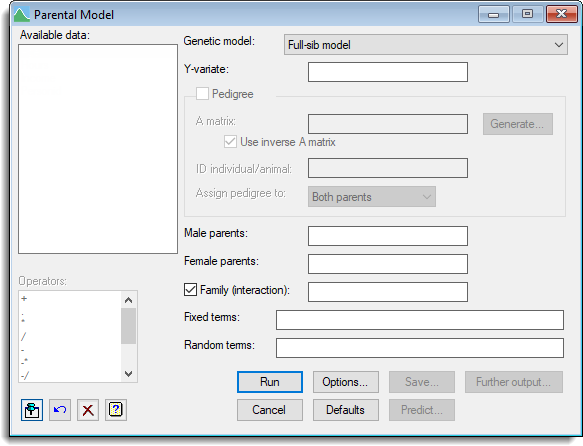Select menu: Stats | Genetic Models | Parental Model
Use this to fit parental models. Models available include those for full-sib, half-sib and sire models.
- After you have imported your data, from the menu select
Stats | Genetic Models | Parental Model. - Fill in the fields as required then click Run.
You can set additional Options then after running the analysis you can save the results by clicking Save.

Available data
This lists data structures appropriate to the current input field. Double-click a name to copy it to the current input field or type the name.
Genetic model
Selects the type of parental model to be analysed.
| Full-sib model | Fits a full-sib model where terms are fitted for both parents and/or the interaction between them. |
| Half-sib model | Fits a half-sib model where a term is included for one parent of the offspring. |
| Sire model | Fits a sire model where a term is included for the sires of the offspring. |
Y-variate
Specifies the response variate for analysis.
Pedigree
Specifies a pedigree for the parentage of the individuals or animals for half-sib or sire models.
| A matrix | Specifies the relationship matrix for the pedigree. The values can be supplied within a symmetric matrix or in a pointer to a sparse inverse form. A sparse form of the inverse matrix can be generated by clicking on the Generate button. If the inverse relationship matrix is supplied then select the Use inverse A matrix option. |
| ID individual/animal | A factor identifying the individuals/animals within the pedigree. |
| Assign pedigree to | Specifies whether the pedigree is assigned to either the male, female or both parents. |
Male parents
For a full-sib model this specifies a factor identifying the male parents.
Female parents
For a full-sib model this specifies a factor identifying the female parents.
Family (interaction)
When selected for a full-sib model it will include a family or interaction term in the model. The family can either be supplied within a factor or if the field is left empty it will be specified as the interaction between the two parents.
Family factor
For a half-sib model this specifies a factor identifying the parent.
Sire factor
For a sire model this specifies a factor identifying the sires.
Fixed terms
The fixed model describes imposed treatment factors and covariates for which the effect of specified levels or values are of interest. The model is described using a formula, which can combine main effects and interactions of factors and also covariates.
Random terms
Allows additional terms to be included in the random model. The random model is generally used to describe those factors for which the values present in an experiment can be considered drawn from some large homogeneous population. The model is described using a formula, which can combine main effects and interactions of factors and also covariates.
Action buttons
| Run | Run the analysis. |
| Cancel | Close the dialog without further changes. |
| Options | Opens a dialog where additional options and settings can be specified for the analysis. |
| Defaults | Reset options to the default settings. Clicking the right mouse on this button produces a shortcut menu where you can choose to set the options using the currently stored defaults or the Genstat default settings. |
| Save | Opens a dialog where you can save results from the analysis. |
| Predict | Allows you form predictions based on the current model. |
| Further output | Opens a dialog for specifying further output from the analysis and displaying residual and means plots. |
Action Icons
| Pin | Controls whether to keep the dialog open when you click Run. When the pin is down |
|
| Restore | Restore names into edit fields and default settings. | |
| Clear | Clear all fields and list boxes. | |
| Help | Open the Help topic for this dialog. |
See also
- Individual/animal models
- Generating a pedigree
- Linear mixed models for mixed model analysis and model building.
- QTL analysis using menus
- REML directive for command mode use of REML.
- VCOMPONENTS directive for further information about fixed and random model terms.